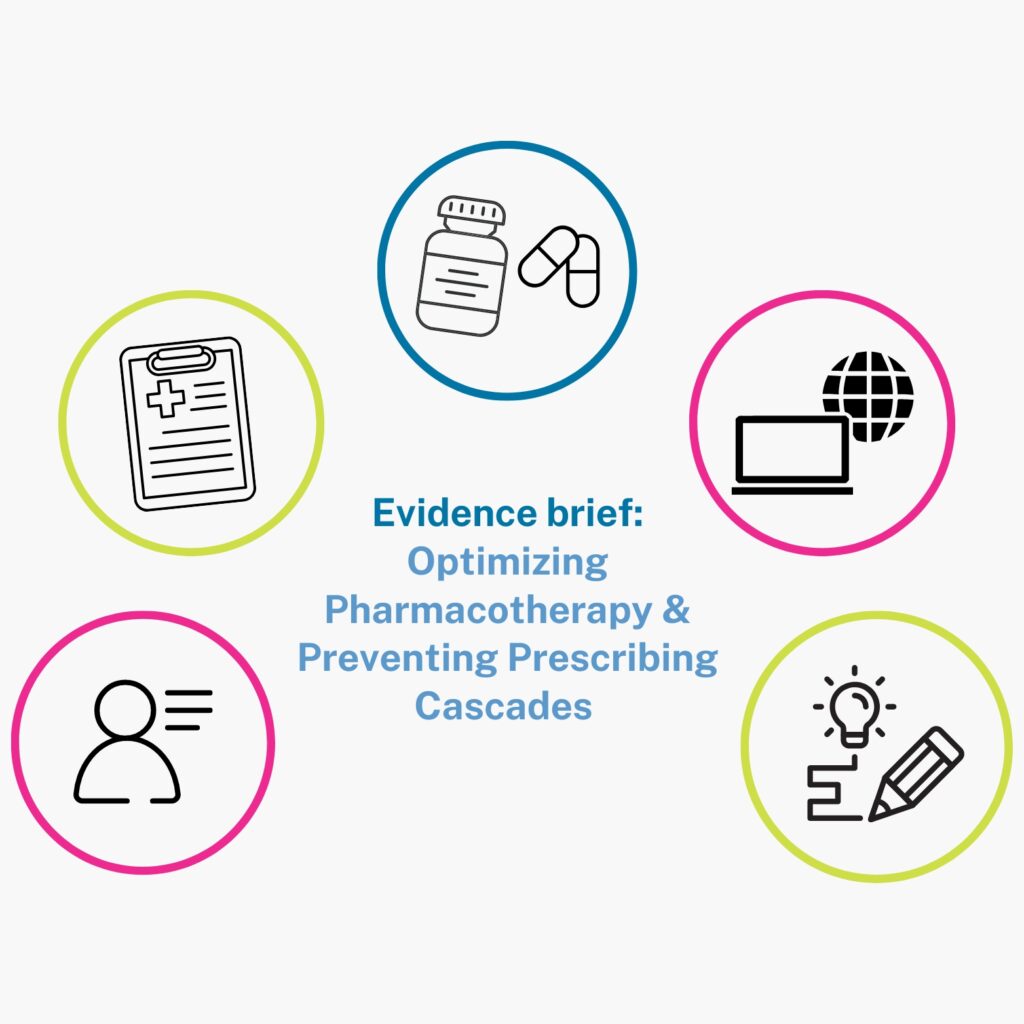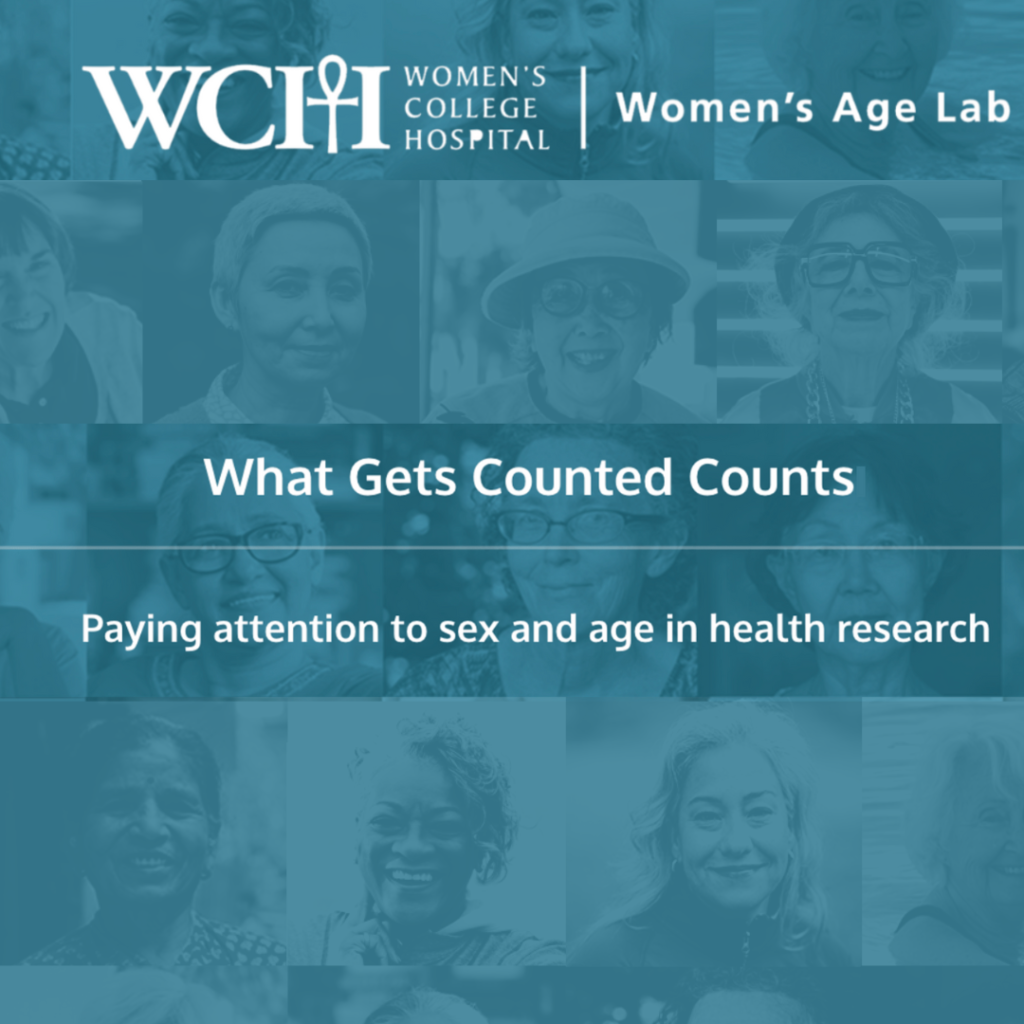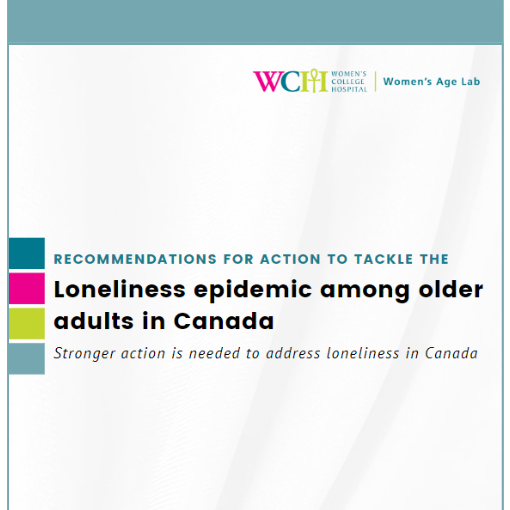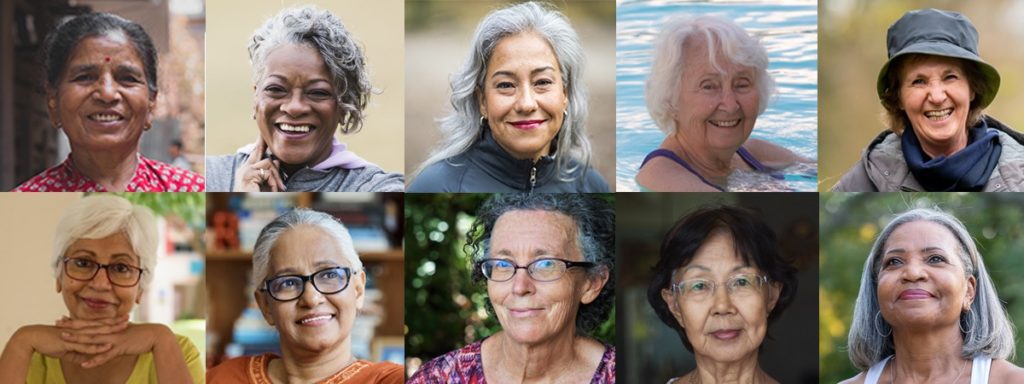
To stay healthy as we age, we need social services in the community we can rely on and health care services that pay attention to our unique health and social needs.
But for older women, that’s not happening.
The first and only centre of its kind in the world, Women’s Age Lab is a space for exploration and collaboration on science-driven system and social change that improves the lives of older women.
Women’s Age Lab aims to support the healthy aging of women by reimagining a system and society where older women and their distinct well-being and health needs are recognized and addressed. Together with researchers, healthcare providers, community-based organizations, policy makers and older women themselves, we will be a catalyst to improve the lives of older women around the world.
Resources
Follow Women’s College Hospital on social media!
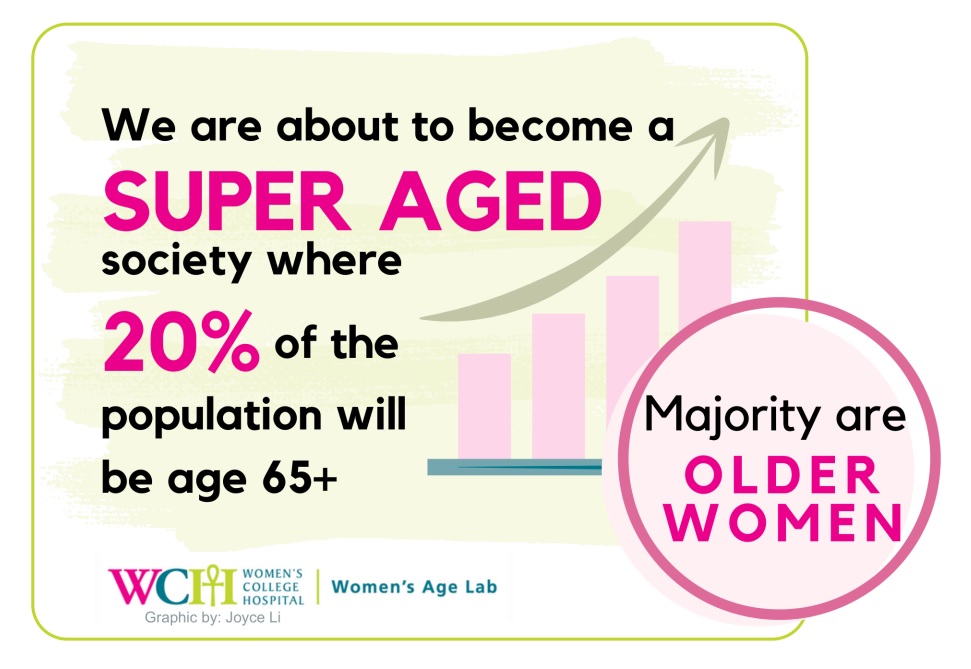
Founded in 2021, Women’s Age Lab is committed to improving the lives of older women by focusing exclusively on their needs.
Women’s Age Lab plays a critical role in advancing the Women’s College Hospital’s vision for a healthier, more equitable world.
Vision
A world where science is used to recognize and address the unique health and well-being needs of older women.
Mission
To improve the lives of older women by using science to transform care and practice, and drive health system and social change.
Our Values
- Committed to equity, diversity and inclusion across our mandate
- Advancing science-based inquiry
- Putting ideas into action
- Strengthening intergenerational solidarity and mentorship
We Are All in This Together
At Women’s Age Lab, we are committed to building an inclusive, just and equitable community that values, supports and honours the wisdom, lived experience and contributions of all people. Our work is intended to benefit people of all genders. We aim to cultivate and strengthen a culture of equity, diversity and inclusion in everything we do.
At Women’s Age Lab, we envision a health care system — and a society — that supports women as they age one where the default question asked by policy makers and care providers is: “well, what about older women?” That question should be asked no matter if we’re talking about who should be included in a clinical trial, or what is needed to support people who want to grow older at home, or how we collect data.
We believe asking that question will drive answers in the form of focused interventions and help us find and test solutions tailored to older women.
Guided by this ethos, we will change the way we think, feel and act towards older women through science and by closing the sex/gender and age data gap in these four distinct and interconnected areas:
Our Priorities
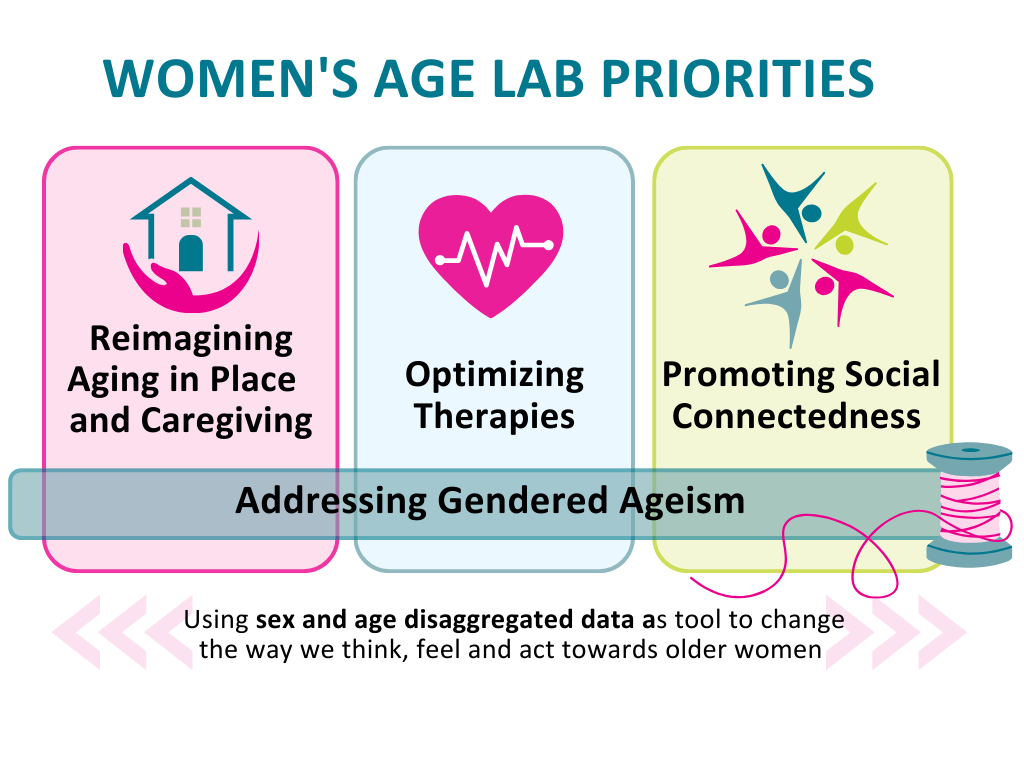
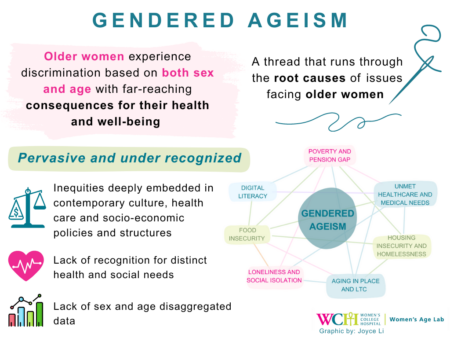
Our Lab will promote equity and inclusion by making a compelling, science-based case for the importance of valuing the lived experiences and contributions of all older women. We will work to ensure that the unique health and well-being needs of older women are recognized and responded to by the people who plan and deliver health care and social programs for them.
- Duncan, D. (n.d.). The Significant Impact of Gendered Ageism on Older Women. Coming of Age Podcast.
- Rochon, P., & Kalia, S. (2022, January 3). Canada needs a national aging strategy that includes older women. Toronto Star.
- Rochon, P., Kalia, S., & Higgs, P. (2021, September 23). Addressing Gendered Ageism: A better retirement for all women | The OECD Forum Network. Organisation for Economic Co-Operation and Development (OECD).
- Gendered ageism: addressing discrimination based on age and sex. The Lancet. 2021 July 27
Additional Resources:
- Increasing the visibility of older women in clinical research. The Lancet. 2020 May 16
- The Missing Pieces of the COVID-19 Puzzle. The Lancet. 2020 June 14
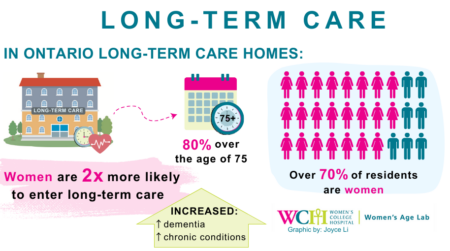
Long-term care homes deliver an essential type of care that will always be needed by some older people, but the reality is most older people live in their own homes. Most of these are women. We need to explore successful models of care to find the best ways to support them so they can get the care they need to stay in their homes and communities.
We are working to Reimagine Aging in Place and Caregiving by ensuring the specific needs of older women and are addressed whether they are living at home or in long-term care. Our research is looking at innovative solutions and opportunities to help older adults, particularly women, age in their own homes longer. Women’s Age Lab scientists are also are raising awareness of the needs of caregivers and strengthening support for caregivers, most being women.
- Brath, H., Kalia, S., Li, J. M., Lawson, A., & Rochon, P. A. (2022). Designing nursing homes with older women in mind. Journal of the American Geriatrics Society, 70(12), 3657–3659.
- Savage, R. D., Rochon, P. A., Na, Y., Strauss, R., Brown, K. A., Costa, A. P., Gill, S., Johnstone, J., Tanuseputro, P., Stall, N. M., & Armstrong, P. (2022). Excess Mortality in Long-Term Care Residents With and Without Personal Contact With Family or Friends During the COVID-19 Pandemic. Journal of the American Medical Directors Association, 23(3), 441-443.e1.
- Congregate Care Settings Working Group. (2022, February). Supporting Long-term Care Home Residents during Omicron. Ontario COVID-19 Science Advisory Table.
- Rochon, P., Li, J., Johnstone, J., Brown, K. A., Armstrong, P., Tanuseputro, P., Savage, R., Gill, S. S., Mather, R., Costa, A. P., McGreer, A., Sinha, S. K., Gardner, C., Perkhun, A., Bodmer, N., Jüni, P., Razak, F., & Born, K. (2022, April). The COVID-19 Pandemic’s Impact on Long-Term Care Homes: Five Lessons Learned. Ontario COVID-19 Science Advisory Table.
- Predictors of Mortality Among Long-Term Care Residents with SARS-CoV-2 Infection. J Am Ger Soc JAGS. 2021 Aug 19
Additional Resources:
- For-profit long-term care homes and the risk of COVID-19 outbreaks and resident deaths. Canadian Medical Association Journal. 2020 August 17
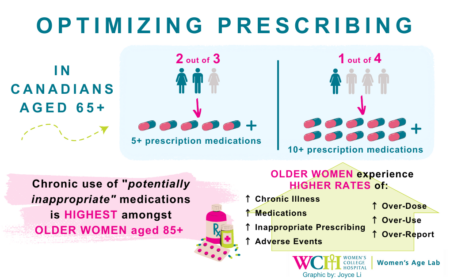
Medication and drug development have been an essential part of healthcare innovation and have made longer lives possible — but at the same time, older women often experience adverse effects from inappropriate drug use. Our team of scientists and researchers at Women’s Age Lab continues to build on our world-renowned research on prescribing cascades and collaborates with international experts to add a sex and gender lens to the issue of medication prescribing. Our findings will be used to develop tools and guidelines that will help healthcare providers make treatment decisions in partnership with patients and caregivers to optimize prescribing, reduce potentially inappropriate polypharmacy by considering deprescribing and reduce overall medication harm for older women.
- Reppas-Rindlisbacher, C., Stall, N., & Rochon, P. (2023, August 28). COVID-19 unleashed a crisis of delirium in our hospitals. The Globe and Mail.
- Rochon, P., Borhani, P., Akerman, J., & Mishra, A. (2022). Physician variation in opioid prescribing: The importance of sex and gender. BMJ Quality & Safety, 31(5), 331–333.
- Rochon, P., Pratt, M., & Rawdat, R. (2023). The Impact of Sex and Gender on Prescribing Cascades in Older Adults. Healthcare Quarterly, 25(4), 6–9.
- Prescribing cascades: we see only what we look for, we look for only what we know. Age and Ageing. 2022 July 01
- Polypharmacy, inappropriate prescribing, and deprescribing in older people: through a sex and gender lens. The Lancet Healthy Longevity. 2021 May 01, 2021
Additional Resources:
To learn more about the team’s international GENDER-NET Plus research funded project, Identifying Key Prescribing Cascades in the Elderly: A Transnational Initiative on Drug Safety (iKASCADE), please click here.
Infographics:
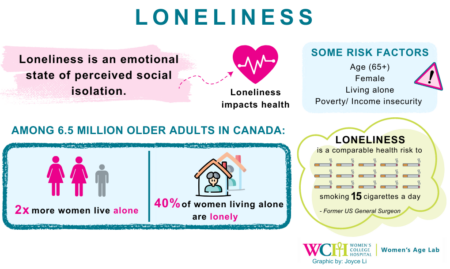
Being socially connected to family, friends, neighbours, and the community is good for our health and well-being, and this is especially true for older adults.
Defined as an emotional state of perceived social isolation, loneliness impacts health among older adults, especially women. Of the 6.5 million older adults in Canada, we know that two-times more women live alone. People who live alone are more likely to be lonely. Loneliness is comparable to smoking 15 cigarettes a day, and most recently, the US Surgeon General declared rebuilding social connections as a top public health priority for the United States.
At Women’s Age Lab, we work to better understand the experience of loneliness in older people, but especially for older women, and develop and share new ideas and strategies to help address this pressing issue.
- Recommendations for action to tackle the loneliness epidemic among older adults in Canada. (2024, March 5)
- Savage, R. (2023, August 3). We have a loneliness crisis—It’s time to act. Toronto Star.
- Savage, R. D., Di Nicolo, S., Wu, W., Li, J., Lawson, A., Grieve, J., Goel, V., & Rochon, P. A. (2022). The Factors Associated With Nonuse of Social Media or Video Communications to Connect With Friends and Family During the COVID-19 Pandemic in Older Adults: Web-Based Survey Study. JMIR Aging, 5(2), e34793.
- Chamberlain, S., Savage, R. D., Bronskill, S. E., Griffith, L. E., Rochon, P., Batara, J., & Gruneir, A. (2023). Retrospective cross-sectional study examining the association between loneliness and unmet healthcare needs among middle-aged and older adults using the Canadian Longitudinal Study of Aging (CLSA). BMJ Open, 13(3), e068769.
- Lu, M., Bronskill, S. E., Strauss, R., Boblitz, A., Guan, J., Im, J. H. B., Rochon, P. A., Gruneir, A., & Savage, R. D. (2023). Factors associated with loneliness in immigrant and Canadian-born older adults in Ontario, Canada: A population-based study. BMC Geriatrics, 23(1), 380.
- Chamberlain, S. A., Savage, R., Bronskill, S. E., Griffith, L. E., Rochon, P., Batara, J., & Gruneir, A. (2022). Examining the association between loneliness and emergency department visits using Canadian Longitudinal Study of Aging (CLSA) data: A retrospective cross-sectional study. BMC Geriatrics, 22(1), 69.
- Loneliness among older adults in the community during COVID-19: a cross-sectional survey in Canada. BMJ Open. 2021 April 2
Additional Resources:
- Looking before we leap: building the evidence for social prescribing for lonely older adults. J Am Ger Soc JAGS.2019 December 16
Founding Director
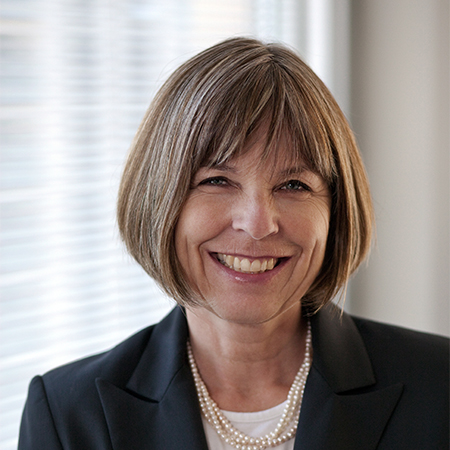
Dr. Paula Rochon MD, MPH, FCRPC
Founding Director, Women’s Age Lab
Senior Scientist, Women’s College Research Institute, Women’s College Hospital
Professor, Department of Medicine and Dalla Lana School of Public Health, and RTOERO Chair in Geriatric Medicine, University of Toronto
Senior Scientist, ICES
Dr. Rochon is Founding Director of Women’s Age Lab, a geriatrician and senior scientist at Women’s College Hospital and ICES. She received her medical degree from McMaster University and Master of Public Health from the Harvard School of Public Health. Dr. Rochon is a professor in the Department of Medicine at the University of Toronto (UofT) and is the inaugural RTOERO Chair in Geriatric Medicine at UofT. She is a Fellow of the Canadian Academy of Health Sciences and a Fellow of the Canadian Geriatrics Society (FCGS).
Dr. Rochon has a strong record of federal funding and has published more than 300 papers in peer-reviewed journals. She held the role of the Vice President of Research at Women’s College Hospital for 12 years. Dr. Rochon chairs the Canadian Institutes for Health Research (Canada’s federal funding agency) Institute of Aging Advisory Board to support research and promote healthy aging across Canada. She is the Deputy Editor of the Journal of the American Geriatrics Society (JAGS). She was a member of the Ontario COVID-19 Science Advisory Table, when it was active, where she chaired the Congregate Care Setting Working group.
She has received research distinctions, including being elected to the Canadian Academy of Health Sciences in 2013. She was awarded the Eaton Clinical Researcher of the Year Award from the University of Toronto in 2020, and the Eugenie Stuart Award for the Best Thesis Supervisor from the University of Toronto, Institute of Health Policy, Management and Evaluation, in 2022.
Dr. Rochon is committed to the development of trainees and new investigators in aging research and making valuable contributions to our future understanding of aging. Her team has won prestigious research awards, presented across Canada, and published in peer-reviewed academic journals, disseminating key learnings and important findings from their research projects.

Dr. Savage is a Scientist with the Women’s Age Lab and the Women’s College Research Institute, where she collaborates frequently with Dr. Rochon. She received her PhD in epidemiology, from the Dalla Lana School of Public Health at University of Toronto. Dr. Savage is investigating loneliness and social isolation in older adults at the population-level to understand how we can improve the health and well-being of our aging population and alleviate demands on our healthcare system. She is using a variety of approaches, including surveys and focus groups, to understand the experience of loneliness in women and to determine whether older women and men have shared, or unique, risk factors, to better address the needs of all older adults.
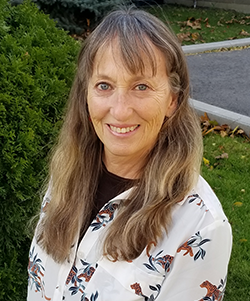 Dr. Mason is a Scientist with the Women’s College Research Institute. She received her PhD in Applied Psychology at the University of Toronto. For over 20 years, Dr. Mason has worked with equity-seeking groups and undertaken activities to promote inclusive practices in research and health service delivery. Her work in health equity has had a dual focus: Improving research outcomes by integrating an intersectional sex and gender lens (SGBA+) into all research methods and processes; and, refining healthcare services to better meet the needs of those who have experienced gender-based violence. Each of these initiatives has been characterized by extensive outreach and engagement with academics, frontline providers, and patient partners/community members. Dr. Mason’s work has included the creation of educational modules and materials, as well as the mentoring of trainees, students, and service providers on a local, provincial, and national scale.
Dr. Mason is a Scientist with the Women’s College Research Institute. She received her PhD in Applied Psychology at the University of Toronto. For over 20 years, Dr. Mason has worked with equity-seeking groups and undertaken activities to promote inclusive practices in research and health service delivery. Her work in health equity has had a dual focus: Improving research outcomes by integrating an intersectional sex and gender lens (SGBA+) into all research methods and processes; and, refining healthcare services to better meet the needs of those who have experienced gender-based violence. Each of these initiatives has been characterized by extensive outreach and engagement with academics, frontline providers, and patient partners/community members. Dr. Mason’s work has included the creation of educational modules and materials, as well as the mentoring of trainees, students, and service providers on a local, provincial, and national scale.
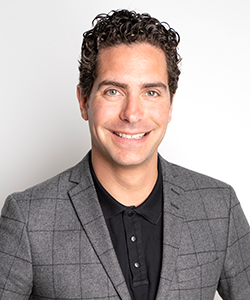 Dr. Stall is a geriatrician and clinician scientist with the Women’s Age Lab and Women’s College Research Institute, as well as an Assistant Professor in the Department of Medicine at the University of Toronto. He received his medical degree from Western University and completed his residency in Internal Medicine and fellowship training in Geriatric Medicine at the University of Toronto. He also received a PhD in Clinical Epidemiology & Health Care Research at the Institute of Health Policy, Management and Evaluation (IHPME) at the University of Toronto. His research interests include family caregiving, long-term care, drug safety for older adults, sex- and gender-based determinants of ageing, and health care utilization among persons with dementia. During the COVID-19 pandemic he served as the Assistant Scientific Director of Ontario’s COVID-19 Science Advisory Table and a Network Science Advisor for CanCOVID.
Dr. Stall is a geriatrician and clinician scientist with the Women’s Age Lab and Women’s College Research Institute, as well as an Assistant Professor in the Department of Medicine at the University of Toronto. He received his medical degree from Western University and completed his residency in Internal Medicine and fellowship training in Geriatric Medicine at the University of Toronto. He also received a PhD in Clinical Epidemiology & Health Care Research at the Institute of Health Policy, Management and Evaluation (IHPME) at the University of Toronto. His research interests include family caregiving, long-term care, drug safety for older adults, sex- and gender-based determinants of ageing, and health care utilization among persons with dementia. During the COVID-19 pandemic he served as the Assistant Scientific Director of Ontario’s COVID-19 Science Advisory Table and a Network Science Advisor for CanCOVID.

Haley Warren is the Project Manager at Women’s Age Lab. She holds a Master’s in Health Sciences with a Specialization in Community Health, and a Bachelor of Arts Honours in Psychology from Queen’s University. Haley has extensive experience in managing the design, delivery and evaluation of healthcare improvement initiatives across Canada, and has a background in community-based research and engagement. She is passionate about facilitating meaningful partnerships with all stakeholders and supporting engagement across the healthcare system. Haley utilizes these skills to support and work closely with all partners at Women’s Age Lab.
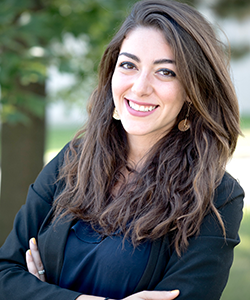 Razan Rawdat is the Research Associate, Knowledge Mobilization at Women’s Age Lab. She received her Master’s degree from the University of Toronto in Translational Research and has over five years of experience in mobilizing research knowledge into practice. Razan has a background in knowledge translation and mobilization in research labs, hospitals, and non-profit organizations. She collaborates with the team to develop knowledge mobilization strategies to disseminate research, engage stakeholders, and raise awareness about healthy ageing and older women’s wellbeing.
Razan Rawdat is the Research Associate, Knowledge Mobilization at Women’s Age Lab. She received her Master’s degree from the University of Toronto in Translational Research and has over five years of experience in mobilizing research knowledge into practice. Razan has a background in knowledge translation and mobilization in research labs, hospitals, and non-profit organizations. She collaborates with the team to develop knowledge mobilization strategies to disseminate research, engage stakeholders, and raise awareness about healthy ageing and older women’s wellbeing.
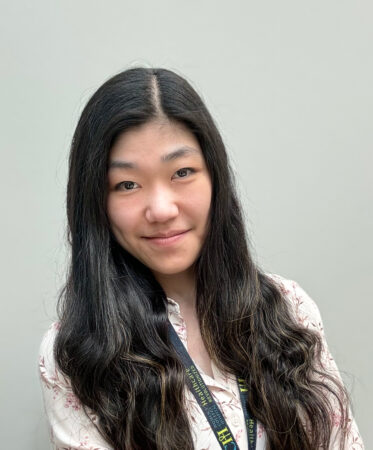 Joyce Li is the Senior Research Lead of Women’s Age Lab, and has contributed greatly to the lab for the past 5 years. She has played a key role in the building of Women’s Age Lab and has contributed to our ongoing evolution and growth. Joyce is currently completing her Master of Science in Health Communications with a specialization in in Visual and Digital Health Communications part time through Boston University, expecting to graduate this August. Prior, she graduated with an Honours Bachelor of Science specializing in Psychology, Neuroscience and Behaviour from McMaster University and brings over ten years of clinical and academic research to Women’s Age Lab.
Joyce Li is the Senior Research Lead of Women’s Age Lab, and has contributed greatly to the lab for the past 5 years. She has played a key role in the building of Women’s Age Lab and has contributed to our ongoing evolution and growth. Joyce is currently completing her Master of Science in Health Communications with a specialization in in Visual and Digital Health Communications part time through Boston University, expecting to graduate this August. Prior, she graduated with an Honours Bachelor of Science specializing in Psychology, Neuroscience and Behaviour from McMaster University and brings over ten years of clinical and academic research to Women’s Age Lab.
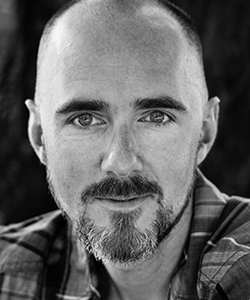 Peter Anderson is a Research Program Manager for Women’s Age Lab and for Dr. Rochon’s team at Women’s College Research Institute. Peter received his BA from the University of Western Ontario. With 15 years of experience working with Dr. Rochon and her team, Peter provides expert advice and guidance to staff and trainees across multiple research areas. He works closely with Dr. Rochon and provides administrative, logistical, planning and technical support for the team, and coordinates reporting to funders and partners.
Peter Anderson is a Research Program Manager for Women’s Age Lab and for Dr. Rochon’s team at Women’s College Research Institute. Peter received his BA from the University of Western Ontario. With 15 years of experience working with Dr. Rochon and her team, Peter provides expert advice and guidance to staff and trainees across multiple research areas. He works closely with Dr. Rochon and provides administrative, logistical, planning and technical support for the team, and coordinates reporting to funders and partners.
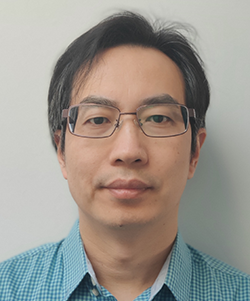 Wei Wu is a statistical analyst of Women’s Age Lab and part of Dr. Rochon’s team at Women’s College Research Institute. Wei received his MSc in Biostatistics program from the University of Toronto. He has more than 15 years of experience providing statistical analyses for a wide range of funded clinical research projects. He assists researchers and trainees with the preparation of grant proposals, conducts data analyses on local and provincial health databases, and prepares manuscripts and reports.
Wei Wu is a statistical analyst of Women’s Age Lab and part of Dr. Rochon’s team at Women’s College Research Institute. Wei received his MSc in Biostatistics program from the University of Toronto. He has more than 15 years of experience providing statistical analyses for a wide range of funded clinical research projects. He assists researchers and trainees with the preparation of grant proposals, conducts data analyses on local and provincial health databases, and prepares manuscripts and reports.
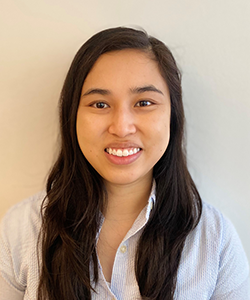 Christina Yu is a Research Coordinator with the Women’s Age Lab. Christina received her Honours Bachelor of Science from Queen’s University. She works closely with Dr. Savage assisting studies looking at loneliness in older adults in the community
Christina Yu is a Research Coordinator with the Women’s Age Lab. Christina received her Honours Bachelor of Science from Queen’s University. She works closely with Dr. Savage assisting studies looking at loneliness in older adults in the community
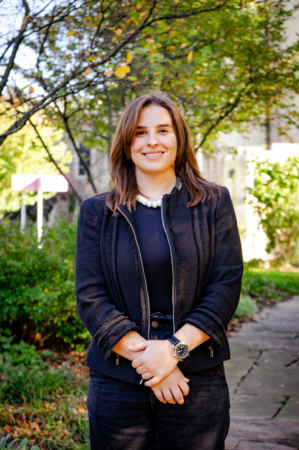
Stephanie Hatzifilalithis is the Research Lead for the Healthy Cities Project Grant with Women’s Age Lab. She earned her PhD in Social Gerontology at McMaster University and completed a Postdoctoral Fellowship at the McMaster Institute for Research on Aging. Stephanie has been awarded a SSHRC doctoral scholarship, Ontario Graduate/Queen Elizabeth II Graduate Scholarships in Science and Technology, and a Wilson Leadership Scholar Award. Her work was focused on intergenerational dynamics, co-housing, and ageism and brings an interdisciplinary lens to challenges facing aging populations with a BSc Hons in Psychology from the International Faculty of The University of Sheffield and a MSc in Cognitive Neuroscience from University College London, UK.
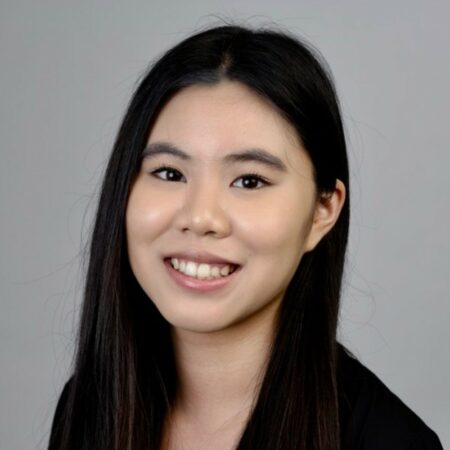 Amy Ly is a Research Coordinator III with Women’s Age Lab. She received her Master of Science in Laboratory Medicine and Pathobiology from the University of Toronto, where she also completed her Bachelor of Science with honours. Amy has extensive experience in implementation science, community-based research and clinical research. At Women’s Age Lab, she is dedicated to applying her expertise and knowledge towards improving the well-being and lives of older women.
Amy Ly is a Research Coordinator III with Women’s Age Lab. She received her Master of Science in Laboratory Medicine and Pathobiology from the University of Toronto, where she also completed her Bachelor of Science with honours. Amy has extensive experience in implementation science, community-based research and clinical research. At Women’s Age Lab, she is dedicated to applying her expertise and knowledge towards improving the well-being and lives of older women.

Kerry Bruner is the Project Manager for the Healthy Cities Implementation Science Team Grant. She received her Master of Arts degree from McMaster University in Health and Aging and she holds a Bachelor of Arts Honours in Sociology from the University of Windsor. Kerry has over 10 years of experience working in healthcare with a focus on person-centred care, engagement, and health system improvement. Kerry is dedicated to making health outcomes and experiences better for older adults by improving social determinants of health and maximizing quality of life.
Women’s Age Lab is at the forefront of training the future generation of scientists and clinicians.
Meet our Summer Research Students!

Trainees
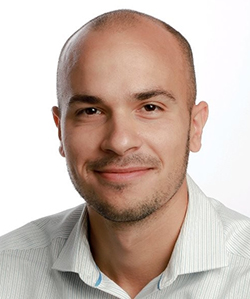
Vasily Giannakeas, PhD
Vasily Giannakeas is a Research Fellow with the Women’s Age Lab at the Women’s College Research Institute. Dr. Giannakeas completed his PhD in Epidemiology at the Dalla Lana School of Public Health. His primary research interest is the use of administrative health data to answer epidemiological questions. He has a strong background in epidemiologic methods, statistics, programming, and research design. Dr. Giannakeas will join the Women’s Aging Lab team as a methodologist.

Dr. Christina Reppas-Rindlisbacher, MD PhD(c)
Dr. Reppas-Rindlisbacher is a trainee with the Women’s Age Lab at the Women’s College Research Institute. Dr. Reppas-Rindlisbacher received her medical degree from the University of Toronto and went on to complete a residency in internal medicine and subspeciality training in geriatric medicine. She is currently working as a geriatrician whilst completing her PhD in Clinical Epidemiology & Health Care Research at the Institute of Health Policy, Management and Evaluation (IHPME) at the University of Toronto. Her doctoral research will use administrative databases to explore practice patterns and long-term adverse health outcomes for older adults after delirium. Her goal is to better understand how delirium care differs depending on sociodemographic factors such as gender, income, language, and recent immigrant status. She co-authored a book chapter in “Hazzard’s Geriatric Medicine and Gerontology” and has been awarded several honors including the prestigious Canadian Institutes of Health Research Vanier Graduate Scholarship and the AGS Scientist-in-Training Research Award.
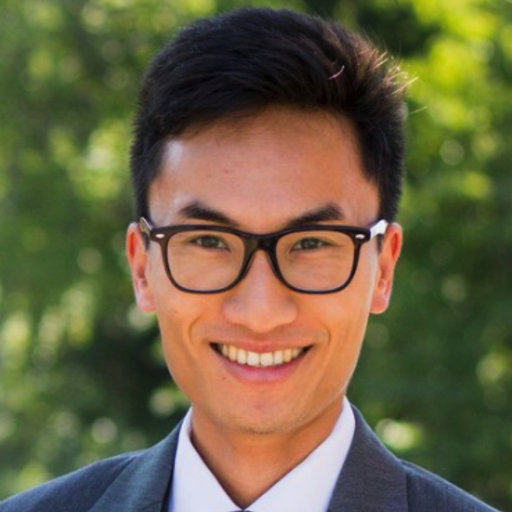
Dr. Peter Hoang, MD
Dr. Hoang is a trainee with the Women’s Age Lab at the Women’s College Research Institute. Dr. Hoang received his medical degree from McMaster University and completed internal medicine training at the University of Calgary. He is currently completing his geriatric medicine subspecialty training at the University of Toronto. His research interests are using a mixed methods approach to understand the lived experiences of older adults who are at risk of, or face homelessness. Specifically, his research will use administrative databases to understand risk factors associated with homelessness in combination with components such as sex, gender, and culture, and its translation to health outcomes in older adults.

Altea Kthupi, PhD Student
Altea Kthupi is a PhD student at the Dalla Lana School of Public Health, University of Toronto. Currently a trainee at the Women’s Age Lab within the Women’s College Hospital, her research focuses on exploring pharmacotherapy equity for older women. By applying intersectionality theory to geriatric medicine, Altea seeks to understand the complex layers of intersecting inequities in pharmacotherapy. This endeavor builds upon her previous work as a Research Coordinator at the Women’s Age Lab, where she laid a strong foundation for her current academic and research trajectory.
Advisory Council
Co-Chairs
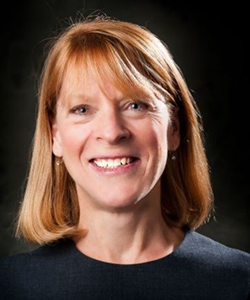
Dr. Gillian Hawker
Sir John and Lady Eaton Professor and Chair of the Department of Medicine at the University of Toronto and a Senior Scientist at the Women’s College Research Institute
Gillian Hawker is the Sir John and Lady Eaton Professor and Chair of the Department of Medicine at the University of Toronto and a Senior Scientist at the Women’s College Research Institute. She is a health services researcher whose research focus has been on disparities in access to care for people living with osteoarthritis. She has published over 300 peer-reviewed articles and was the 2020 recipient of the International Osteoarthritis Research Society’s Clinical Research Award. In her role as Department Chair, she has been implementing strategies to enhance equity, diversity and professionalism, with a particular focus on advancing women & marginalized groups in academic medicine.
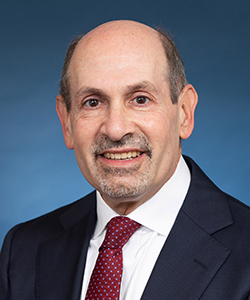
Dr. Jerry H. Gurwitz
The Dr. John Meyers Professor of Primary Care Medicine. Professor of Medicine, Family Medicine and Community Health, and Population & Quantitative Health Science. Chief, Division of Geriatric Medicine UMass Chan Medical School and UMass Memorial Medical Center
Jerry Gurwitz is the Executive Director of the Meyers Health Care Institute, a joint endeavor of UMASS Chan Medical School, Reliant Medical Group, and Fallon Health. He also serves as Chief of the Division of Geriatric Medicine at the University of Massachusetts Medical School where he is the Dr. John Meyers professor of primary care medicine. Dr. Gurwitz’s research has focused on improving medications use in older adults, especially those residing in long-term care settings. He has authored numerous original articles, reviews, commentaries, and book chapters in the area of geriatric pharmacotherapy and is a respected teacher and public advocate for improving care of older adults. He is currently principal investigator of the National Institute on Aging-funded Advancing Geriatrics Infrastructure and Network Growth (AGING) Initiative which is a joint endeavor of the Health Care Systems Research Network and the Older Americans Independence Centers. The AGING Initiative focuses on advancing the science of multiple chronic conditions in older adults.
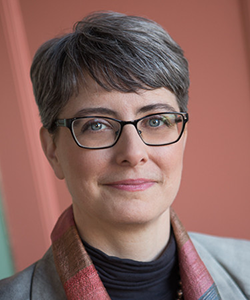 President and CEO of Healthcare Excellence Canada
President and CEO of Healthcare Excellence Canada
Jennifer Zelmer is the inaugural President and CEO of Healthcare Excellence Canada, the new organization formed in 2020 through the amalgamation of the Canadian Foundation for Healthcare Improvement and Canadian Patient Safety Institute to achieve safer, higher quality and more coordinated patient-partnered healthcare.
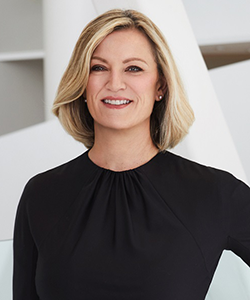 President & CEO of Women’s College Hospital
President & CEO of Women’s College Hospital
Heather McPherson is a highly recognized healthcare executive with extensive experience in clinical, academic and health system leadership. Heather is an innovative leader who has been instrumental in establishing clinical programs and services that close the health gaps for patients throughout the province. She has an unparalleled ability to partner across the healthcare system, build high-performance teams, foster a culture of excellence, and create transformative solutions. Throughout her career, Heather has focused on the evaluation and improvement of the systems of clinical care delivery and redefining what it means to be a patient: engaged, empowered and understood.
 Executive Lead, Social Impact & Global Initiatives, SE Health
Executive Lead, Social Impact & Global Initiatives, SE Health
Tazim Virani is a PhD prepared Registered Nurse working at SE Health as the Executive Lead, Social Impact & Global Initiatives. Her key role is to lead the social impact work on the future of aging towards a vision to forever impact the way we live and age at home across Canada and around the world. She is also the Executive Co-Lead of COURAGE: Action for Better Aging initiative that is focusing on changing the conversation and direction of aging in Canada. Tazim works collaboratively with partners in Canada and internationally on a number of key initiatives.
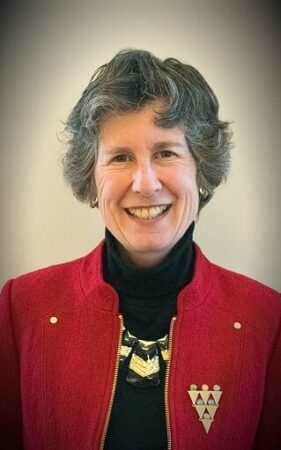 Distinguished Senior Fellow at the Bill Graham Centre for Contemporary International History (University of Toronto), a Senior Fellow at Massey College, and a Professor Emerita of Political Science at the University of Western Ontario.
Distinguished Senior Fellow at the Bill Graham Centre for Contemporary International History (University of Toronto), a Senior Fellow at Massey College, and a Professor Emerita of Political Science at the University of Western Ontario.
Dr. Elizabeth Riddell-Dixon taught graduate and undergraduate courses in international relations at the University of Western Ontario. Her publications include Breaking the Ice: Canada, Sovereignty, and the Arctic Extended Continental Shelf;Canada and the Maritime Arctic: Boundaries, Shelves, and Waters;Canada and the Beijing Conference on Women: Governmental Politics and NGO Participation; Canada and the International Seabed: Domestic Determinants and External Constraints; The Domestic Mosaic: Interest Groups and Canadian Foreign Policy; The State of the United Nations, 1993: North-South Perspectives; International Relations in the Post-Cold War Era; as well as numerous articles and chapters. She has served as Chair of the Department of Political Science (Western), Vice President of the Academic Council on the United Nations System; Vice President of the Board of Directors of the Museum of Ontario Archaeology; Executive Member of the Board of the Canadian Political Science Association; Chair of the Academic Committee of the Board of Directors of the Lester B. Pearson Canadian International Peacekeeping Centre; member of the Executive Committee of the Victoria University Senate; and member of the Board of Directors of Massey College and the Canadian Pugwash Group.
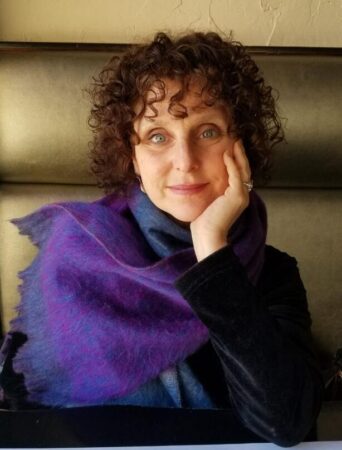
Ilana started her career as a labour and human rights lawyer, and is a passionate advocate for the rights of women and girls. She is the host of the Podcast: Wisdom at Work: Older Women, Elderwomen and Grandmothers on the Move (formerly: Grandmothers on the Move). Ilana spent ten years at the United Nations, eight of them with the UN Development Fund for Women (UNIFEM), where she worked as the Agency’s inaugural CEDAW Advisor, contributed to the founding of the Trust Fund on Ending Violence against Women, and co-founded UNGLOBE (a group advocating for the rights of LGBTQ+ U.N. employees), becoming its first President. In 2003, Ilana co-founded the Stephen Lewis Foundation, to work in mutuality and solidarity with African community-based organizations at the epicenter of the response to the pandemic, supporting their critical work to turn the tide of AIDS at the epicenter of the response to the pandemic. Under Ilana’s leadership as its E.D from 2003-2019, the Foundation moved from her kitchen table to become a $10 million a year fund, supporting over 1800 initiatives with over 300 organizations in the 15 countries in sub-Saharan Africa hardest hit by HIV and AIDS. Among her innovations was the Grandmothers to Grandmothers Campaign, which launched a vibrant worldwide network of activist older women, working to support African grandmothers, the children in their care, and their communities. Ilana has been deeply honoured and grateful to learn from indomitable grandmothers and older women activists the world over.
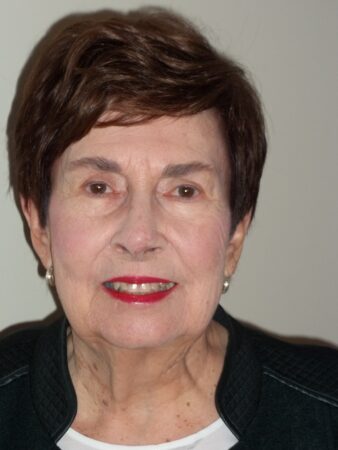 Past Chair, RTOERO Foundation
Past Chair, RTOERO Foundation
Joanne is a retired educator. She received her Bachelor of Arts degree from McMaster University in Hamilton and a Master of Education from the University of Windsor. She began her career as a classroom teacher and then was appointed to an administrative role.
Upon her retirement Joanne joined RTOERO. She chaired several committees at both the local and provincial levels and, eventually, was elected President of RTOERO. It was during this time that the RTOERO Foundation was established. Joanne served as Chair of the Foundation for six years and is, currently, the Past Chair.
Recently, Joanne took part on an Advisory Committee at the National Institute on Aging where two presentations were developed. The focus of the first one was the types of Elder Abuse. The second one looked at Elder Abuse and Dementia. These were presented across Ontario and several other provinces. Joanne gave both presentations to several groups in person and by Zoom.
Joanne has a keen interest in the rights of all aging adults and, in particular, those of women. She participated in the Social Isolation Project led by Dr. Rachel Savage and has provided input to the Intersectoral Collaboration Committee.
In her own community Joanne serves on the Senior Advisory Committee and works closely with the Alzheimer’s Association.
 Professor of the Sociology of Ageing in the Division of Psychiatry at University College London, United Kingdom Paul Higgs is Professor of the Sociology of Ageing in the UCL Division of Psychiatry
Professor of the Sociology of Ageing in the Division of Psychiatry at University College London, United Kingdom Paul Higgs is Professor of the Sociology of Ageing in the UCL Division of Psychiatry
He has a degree in Sociology and a PhD in Social Policy. He has researched many aspects of the changing nature of later life including social divisions, dementia and personhood, consumption and technology. Professor Higgs edits the journal Social Theory and Health and has published widely in social gerontology and medical sociology. He is a Fellow of both the UK Academy of Social Sciences and the Gerontological Society of America.
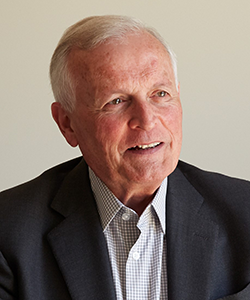 CEO, RTOERO
CEO, RTOERO
Jim Grieve was appointed Chief Executive Officer of the RTOERO in 2015, an organization of 82,500 educators from the early years, K-12 and post-secondary systems, as well as school board employees across Canada. RTOERO is a bilingual trusted voice on healthy active living in the retirement journey. We deliver world-class programs, social engagement and political advocacy.
From 2009 to 2015, Jim was Assistant Deputy Minister of Early Years for the Ontario Ministry of Education, responsible for full-day kindergarten, child care and family support programs. He led the work of creating a seamless early learning experience for children from birth onward.
Following an exemplary career as a teacher and in educational leadership, Jim served as Director of Education for Ottawa-Carleton before heading up Peel District School Board, Canada’s second largest school board.
Jim holds a Master’s Degree from OISE/University of Toronto, along with undergraduate degrees from York University and Victoria College of the University of Toronto.
- Humber College awarded Jim an honorary degree in early childhood education in 2015.
- In 2015 the College of Early Childhood Educators awarded Jim its first every Honorary ECE designation.
- In 2014 he was recognized with a Lifetime Achievement Award from the Government of Ontario.
- The International Association of Business Communicators named Jim 2013 Communicator of the Year.
- In 2016 the Canadian Association for Young Children presented Jim with the Friends of Children Award at its annual conference.
- Jim also was awarded the Spiral of Learning Award by the Ontario Reggio Association in November 2016.
Jim is delighted to meet with and promote the wonderful benefits of the rapidly growing RTOERO to prospective members throughout the broader education sector across Canada.


